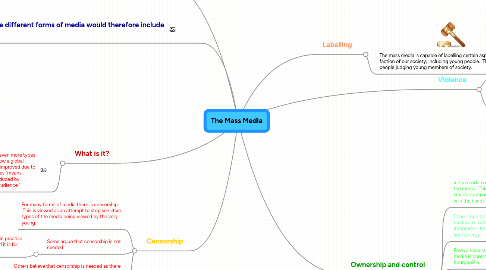The Mass Media
作者:Roderick Pearce


1. The mass media is usually described as ways of communication to large audiences. The different forms of media would therefore include newspapers, magazines, books and films.
2. As an agent of socialisation
2.1. The mass media acts as an agent of socialisation which influences us at a very early age. We are, for example, exposed to televsion from when we are young.
2.1.1. Thus the media has the power to shape our identity.
3. What is it?
3.1. However, as technology has improved there are now even more types of media outlets. MucLuhan describes the world as now a global village as communication has become so much more improved due to the significance of the media. McCullagh (2002) states "means through which content, whether fact or fiction, is produced by organisations and transmitted to and recieved by an audience."
4. Censorship
4.1. For many forms of media there is censorship. This is viewed as an attempt to stop sensitive types of the media being viewed by the very young.
4.2. Some argue that censorship is not needed
4.2.1. They argue that censrship in practise does not work properly and it is for parents discretion.
4.3. Others believe that censorship is needed as there should at least be a guideline and mechanism which protects children's innocence.
5. Labelling
5.1. The mass media is capable of labelling certain aspects and faction of our society; including young people. This leads to people judging young members of society.
6. Violence
6.1. Within the media much violence is shown. This is often portrayed through computer games and film.
6.1.1. It is often argued that this violence can be harmful as it encourages young people to commit crime.
6.1.1.1. Games like GTA have been criticised for the extreme violence.
